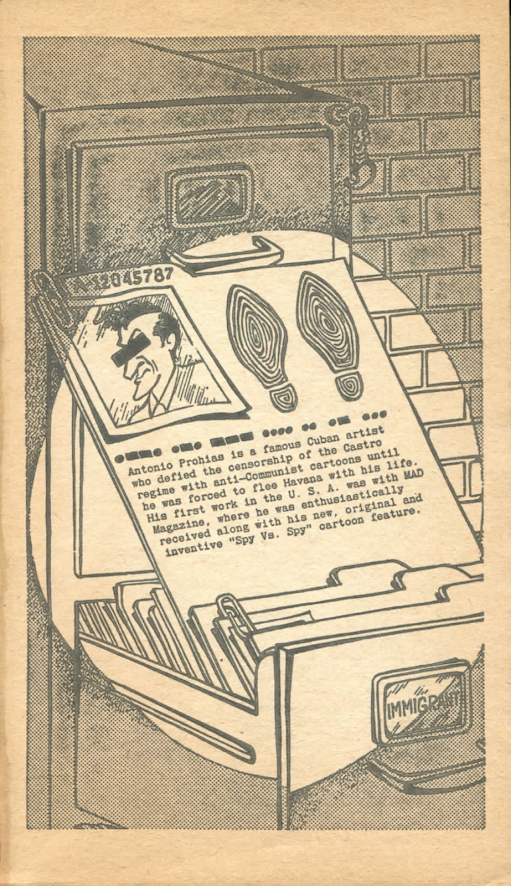 |
| The cover of The All New Mad Secret File on Spy vs Spy by Antonio Prohías, his first such collection, published by Signet in 1965, plus the inside biography of the cartoonist. |
Today is May Day, for normal people a day to celebrate the coming of spring, but for communists, bolsheviks, Marxists, and other socialists one to celebrate murder, oppression, poverty, misery, mass incarceration, and mass starvation. Those things aren't really what socialists celebrate (maybe) but they are nonetheless the products of the socialists' efforts. Even Nazis, who peddled just one more brand of socialism, had an official May Day celebration. As the saying goes, birds of a feather flock together.
On this day sixty-one years ago, Cuban cartoonist Antonio Prohías left his homeland for the United States. Born on January 17, 1921, Prohías had been one of Cuba's leading cartoonists until he began criticizing the new Castro regime. On May 1, 1960, he went into exile from his native country. He never returned.
Just two months later, on July 12, 1960, Prohías walked into the New York offices of Mad with a portfolio he had developed since coming to America. Although he spoke no English, he walked out with $800 in payment for his first cartoons to appear in the magazine. In all, Prohías created 241 episodes showing the never-ending battle between a nameless black spy and his equally nameless white nemesis. Spy vs. Spy must surely be considered one of the great comic strips of the twentieth century.
Although there isn't any overt political commentary in Spy vs. Spy, the cartoonist understood the machinery and imagery of oppression and of state-sponsored murder, and he depicted these things to perfection. With their comically grotesque faces, physiques, uniforms, and ornate decorations, his nameless spymasters/regime leaders are only barely exaggerated versions of the real thing. The socialist oppressor and murderer has since learned to be more subtle than that, so subtle in fact that he--and she--have wormed their way into the highest levels of Western government, academia, entertainment, media, and commerce. If he were still living and working today, Antonio Prohías would have to learn equally more subtle ways of lampooning them.
Antonio Prohías died on February 24, 1998, at age seventy-seven in Miami, Florida. If he had lived, he would have turned one hundred years old in 2021. And if he had lived to this May Day, he would have seen not the end of communism in Cuba but at least the end of the Castro dynasty, a happy yet unhappy event that occurred on April 19, 2021.
Antonio Prohías was born in the city of Cienfuegos in Cuba. If we can stretch a metaphor, we can observe that Cienfuegos means "one hundred fires" in Spanish, and we can say that in memory of Prohías and his life's work we might light one hundred fires of freedom, one for each of the one hundred years since his birth. May socialism be one day relegated not only to the dustbin of history but also to that of human thought, belief, and experience. May it soon perish and may the people of the not-very-distant future wonder why anyone would ever have believed in such utterly stupid, outlandish, and ultimately murderous things.
Text copyright 2021 Terence E. Hanley






